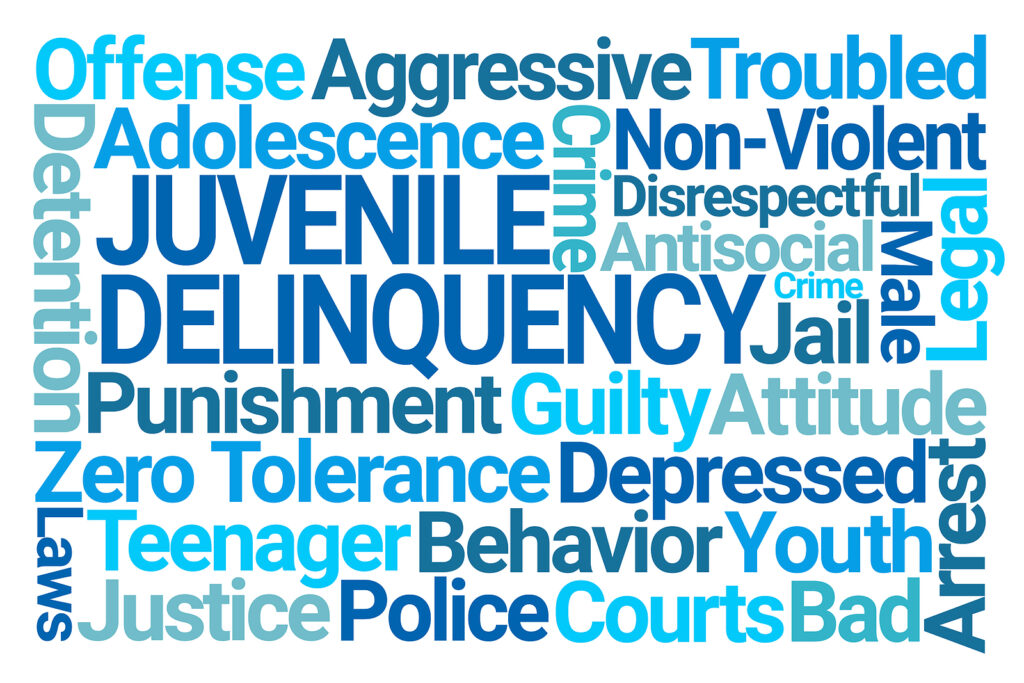A person is legally deemed a juvenile if they are under the age of 18. Although juveniles are also referred to as minors, a minor can also be someone who is under 21 years old and therefore, still prohibited to consume or purchase alcoholic beverages. If your pre-teen or adolescent was arrested, they will likely be prosecuted in the Indiana juvenile court system.
Continue below to learn what to expect when you enter the court room for your child’s case, plus how to best prepare your teen’s defense to avoid the maximum penalties for their charges.

Delinquent Offenses Versus Status Offenses
Kids will be kids, but when kids break the law, they can be subjected to criminal penalties in the juvenile court system. There are two primary types of juvenile crimes: delinquent offenses and status offenses. Delinquent offenses are crimes that can be committed by children and adults, like driving without a license, vandalism, shoplifting, illegal drug use, assault, and battery. Status offenses are crimes that can only be committed by juveniles, such as curfew violations, truancy, running away from home, and underage drinking.
In most cases of status offenses, at least the minor ones, juveniles are often given the option to cooperate with a supervised probation and behavioral modification plan rather than going in front of a judge. In more serious cases of both status and delinquent offenses among juveniles, a child or teenager may be required to go to court and be adjudicated by a judge.
Juvenile Court Process of
When you enter juvenile court, you will see a lot of people present, but rest assure, they are there to serve a good purpose. You can expect to see your own criminal defense attorney, the prosecutor, the magistrate or presiding judge (or in some cases, a commissioner or referee), an intake officer, and possibly a probation officer.
▷ Initial Hearing – The first hearing is known as the initial hearing. This is when the juvenile is told what they are being charged with. During the initial hearing, it is imperative that you have a juvenile criminal defense lawyer present and working your case.
▷ Detention Hearing – If a juvenile is being detained by the Department of Corrections, their detention hearing should take place within the first 48 hours of arrest; but this does not include holidays or weekends.
▷ Waiver Hearing – If the prosecutor wants the judge to move the juvenile’s case from juvenile court to adult court, there will be a waiver hearing scheduled. Again, it is critical to have private criminal defense for your juvenile if a waiver hearing is set into motion.
▷ Fact-Finding Hearing – When witness testimonies are required for juvenile case, a fact-finding hearing will be scheduled in which the witnesses will tell the judge what they know about the case.
▷ Review Hearing – A judge will request a review hearing after juvenile’s conviction to see how they are doing with their progress, and court orders.
Juvenile Sentences
If a juvenile is sentenced for their offense, they are often put on probation, which can be either supervised or unsupervised, but in more serious cases, they can be sentenced to the Department of Corrections. for juveniles. Additional court ordered penalties that may be headed down to a convicted juvenile include community service, restitution, school attendance, rehabilitation, counseling, diversion programs, and house arrest.
A juvenile’s arrests and convictions stay on their permanent record even after they turn 18. However, these records may be eligible for criminal record expungement or record sealing. Talk to a trusted Indianapolis criminal defense lawyer to learn more about Indiana’s Second Chance Law if your juvenile has criminal record, or if you yourself have a criminal record from when you were a minor.
Juveniles Tried in Adult Court
If a child or adolescent commits a very serious crime, such as one in the realm of homicide, they may be tried in the adult court system. In such case, it would be critical to your child’s future to hire a skilled and aggressive Indianapolis Indiana criminal defense law firm to represent the case. This would be the best way for them to avoid the maximum penalties for the charges, including prison time.
Is your child or teenager facing criminal charges in Indiana and you have no idea how to protect them from a harsh future? Contact the Law Office of David E. Lewis at 317-636-7514 to connect with one of our esteemed criminal defense attorneys in Indianapolis, Indiana. We can meet over the phone, via online video conference, or in person at our office.
Related Posts:
Can a Child Be a Witness in a Criminal Case?
Options for Police When Children Commit Crimes
Important Laws That Pertain to Parents of Teenagers

